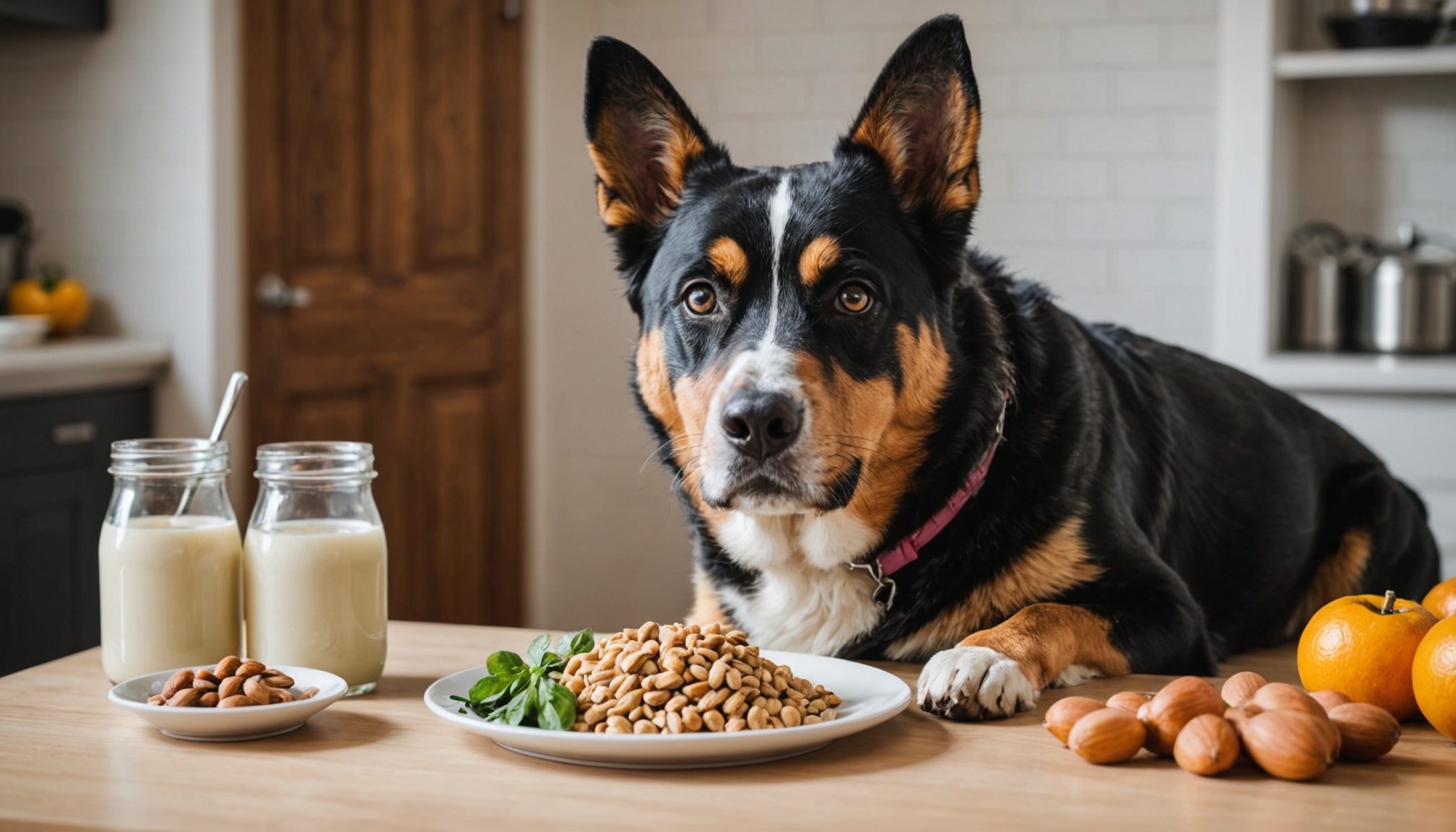Understanding Food Allergies in Dogs
Food allergies in dogs are an immune response to certain common allergens found in their diet. These allergies manifest as symptoms like itching, skin irritations, and gastrointestinal issues. Understanding these symptoms is crucial for addressing canine health concerns effectively.
Common Allergens
The most prevalent common allergens for dogs include beef, chicken, and dairy products. These ingredients are frequently found in commercial dog foods and treats, making them significant culprits in triggering adverse reactions. Recognising the signs when your dog reacts to these allergens can help in pinpointing the source of discomfort.
Have you seen this : Crafting a Secure and Stimulating Environment for Your Pet Reptiles: A Complete Guide
Veterinary professionals emphasise the importance of proper diagnosis and testing to confirm food allergies. Without an accurate diagnosis, it becomes challenging to eliminate the right allergen from your dog’s diet. Veterinarians often conduct elimination diets or blood tests to identify offending ingredients and help tailor a suitable dietary plan.
By understanding the specific food allergies in dogs and seeking professional diagnosis, owners can take informed steps to alleviate their pets’ discomfort and improve their overall well-being.
Also to read : Crafting the Perfect Balanced Diet for Your Diabetic Senior Cat: A Comprehensive Guide
Nutritional Guidelines for Dogs with Food Allergies
Understanding a dog’s nutritional needs is essential, especially when addressing food allergies. A balanced diet is crucial to ensure all necessary nutrients are met despite dietary restrictions. For dogs with food allergies, key nutritional components must be carefully selected to avoid allergens while maintaining health.
Different allergies require specific dietary adjustments. For example, if a dog is allergic to common protein sources like beef or chicken, alternative proteins such as lamb or fish may be recommended. It’s important to pay attention to not only the protein source but also ingredients in the dog food that could be potential allergens.
Consulting a veterinarian or a canine nutritionist can provide tailored advice. These experts can evaluate the dog’s specific conditions and recommend an appropriate dog food. This guidance helps in formulating a diet plan that avoids allergens while sustaining the dog’s overall health. Regular consultations are beneficial in tracking progress and making necessary adjustments to the diet if new allergies develop or existing ones worsen.
Ensuring your dog has a nutritious, allergen-free diet involves careful consideration and ongoing collaboration with professionals to navigate dietary challenges successfully.
Safe Ingredient Choices and Alternatives
When selecting dog food, ensuring safe ingredients is paramount, especially if your pet has sensitivities. Hypoallergenic dog food often incorporates gentle, non-reactive elements designed to minimise allergic reactions. Typical safe ingredients include novel proteins such as duck or rabbit, which are less likely to cause allergic responses compared to more common proteins like chicken or beef.
For those seeking ingredient substitutions to common allergens, consider opting for grain-free formulas that use potatoes or peas instead of corn or wheat, both of which can trigger allergies in sensitive dogs. Additionally, sweet potatoes or quinoa can serve as beneficial carbohydrate sources.
Mastering the art of reading ingredient labels is essential. Look for products that clearly list high-quality proteins and avoid those with vague terms such as “meat by-products,” which can be unsettling to your dog’s system. Note where ingredients are sourced from and ensure they adhere to stringent safety standards. Beware of fillers and artificial preservatives that may exacerbate hypersensitivity.
By focusing on hypoallergenic alternatives and scrutinising labels for safe ingredients, you can significantly reduce the risk of allergic reactions, promoting a happier, healthier life for your canine companion.
Sample Meal Plans for Dogs with Allergies
Creating a thoughtful meal planning routine for dogs with allergies is crucial. Every dog is unique, so consulting a vet for tailored plans is advised. Here’s how you can structure a balanced dog diet plan:
Weekly Meal Plan Overview
A comprehensive weekly feeding schedule helps manage allergies efficiently. Begin by identifying allergen-free foods your dog can enjoy daily. Rotate proteins and incorporate hypoallergenic treats for variety.
Tailored Meal Plans for Specific Allergies
Custom meal plans should exclude common allergens like wheat, soy, or dairy. Use ingredients like lamb or salmon, which are less likely to trigger reactions. A veterinary dietitian can help tailor plans specifically for your dog’s allergies.
Portion Sizes and Feeding Frequency
Maintaining the right portion sizes and setting a consistent feeding schedule is vital. Dogs generally thrive on:
- Two to three small meals per day
- Regular check-ins to adjust portions as needed
Monitor your dog’s weight and appetite to ensure they aren’t over or underfed. Keeping these factors in check will support your dog’s overall health and wellbeing, providing the necessary nutrients without aggravating allergies.
Homemade Recipes for Dogs with Food Allergies
Cooking homemade dog food for canines with allergies can be a rewarding task that ensures your dog receives a balanced and allergy-friendly diet. Start with simple recipes that focus on hypoallergenic dog meals. For instance, a basic meal might include boiled turkey or salmon combined with brown rice and a mix of vegetables such as carrots and peas. This recipe is easy to prepare and avoids common allergens like beef and wheat.
When preparing balanced meals, it’s crucial to incorporate a variety of proteins and carbohydrates while remaining allergy-conscious. Rotate between different protein sources, like duck or fish, and mix carbohydrates like sweet potatoes or oats. This variety not only keeps your dog’s meals interesting but also ensures they receive a broad range of nutrients.
Additionally, consider supplementing meals with essential vitamins and minerals to guarantee nutritional completeness. Consulting with a veterinarian can also provide insights into any specific dietary needs your dog might have. By investing time in cooking for dogs, you can manage their allergies effectively while still providing delicious and diverse meals.
Transitioning to a New Diet
Making a diet transition for your dog requires careful planning and observation. A gradual change is vital to avoid digestive upset. Begin by mixing a small amount of the new food into your dog’s current diet, gradually increasing the new food’s ratio over a week or two. This slow introduction helps your pet’s digestive system adjust without causing discomfort.
During this period, it’s crucial to watch for any intolerance symptoms such as vomiting, diarrhoea, or a sudden decrease in appetite. If these occur, the pace of change should be slowed, or consultation with a vet may be needed to find a suitable dietary choice.
Additionally, varying the times you introduce new ingredients can help identify specific triggers of intolerance. Maintaining this transition approach not only ensures a healthier diet change but also aids in preventing long-term digestive issues.
Veterinary Advice and Ongoing Dietary Management
Regular veterinary consultation is crucial for your dog’s well-being, especially when dietary changes are introduced. A vet’s expertise ensures that any adjustments to your dog’s diet are both safe and effective, providing you with peace of mind. During health check-ups, vets can perform necessary tests to assess how dietary changes are impacting your pet. Identifying issues early can prevent potential health complications.
Close dietary monitoring is essential after implementing any changes to your dog’s nutrition plan. Pay attention to their reactions to new foods, noting any changes in behaviour, energy levels, or digestion. Sharing these observations during veterinary visits can help refine dietary management strategies. This collaboration builds a more tailored diet plan, sensitive to your dog’s unique health needs.
Veterinarians are adept at tweaking diets based on your dog’s health metrics and reactions. Regular communication with veterinarians allows for intentional adjustments. Whether it involves altering portion sizes, introducing supplements, or switching food brands, these changes are guided by a professional understanding of canine nutrition. Trust in your vet’s guidance to support your pet’s optimal health and vitality over time, making informed decisions grounded in expert advice.
Troubleshooting Common Dietary Issues
Navigating dietary problems in dogs, particularly when they have allergies or food intolerances, requires careful observation and management. Commonly, these problems manifest as skin irritations, digestive issues, or behavioural changes. Identifying the cause is crucial but often challenging.
Food intolerance differs from allergies in that it involves digestive rather than immune responses. Symptoms might include vomiting or diarrhoea. To manage this, eliminate suspected foods and monitor the dog’s health. This process, known as an elimination diet, can help pinpoint problematic ingredients.
In severe cases, revisit the vet to adjust the dietary plan. They may recommend hypoallergenic diets, specially designed to be gentle on a dog’s system. Constant communication with a veterinarian ensures that dietary changes meet nutritional needs and support overall health.
Maintaining a detailed log of your dog’s diet and reactions is beneficial. Document any changes or adverse reactions during meals. This record aids both owners and veterinarians in fine-tuning the dog’s diet, ensuring they thrive without the hindrance of food intolerance or other dietary issues.











